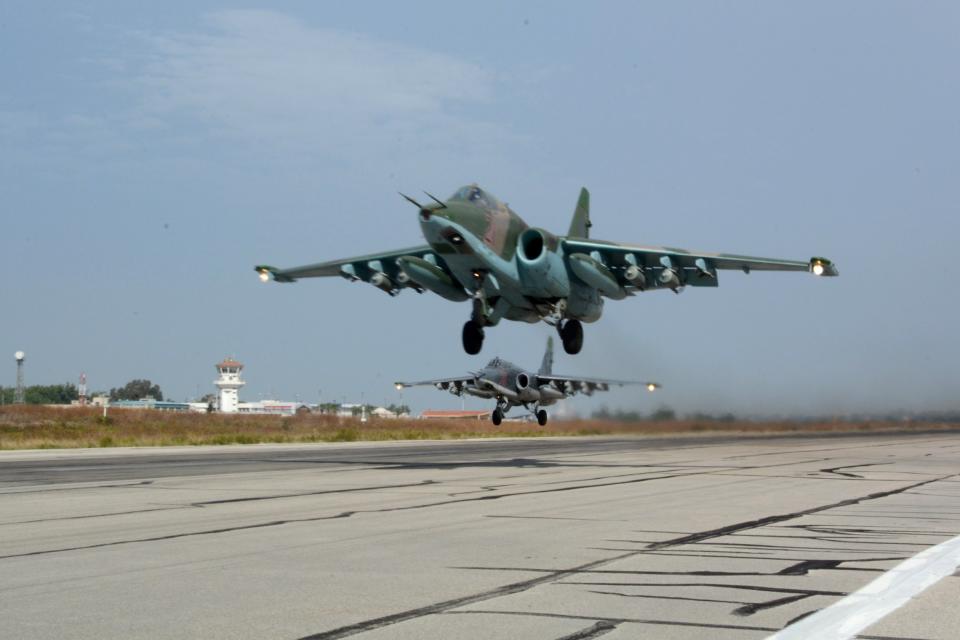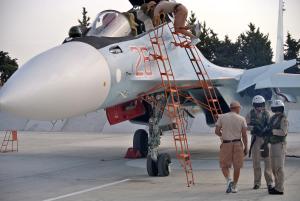With A Little Help From Friends
"Putin's larger strategy is also obvious. He is not reconstructing the old Soviet empire. That's too large a task. But he is rebuilding and reasserting Russia's ability to project power beyond its borders. Annexing Crimea restores to the motherland full control of the warm water Black Sea port that Russia has coveted since Peter the Great. Shoring up a rump Alawite state secures Russia's naval and air bases in the eastern Mediterranean. Add to that Russia's launching advanced cruise missiles from warships in the Caspian Sea to strike Syrian rebels 900 miles away, and you have the most impressive display of Russian military reach since the cold war."
Charles Krauthammer, Washington Post
And even as Russian fighter jets mark Syrian skies as their new strike into world vision as a renewed military power with muscle, Moscow happily preens, projecting itself as a major global player revisited. Helicopter gunships buzzed around the Hemeimeem Airbase in western Syria, and support crews busied themselves attaching a missile to an Su-30 jet preparing for another of the many missions targeting Syrian rebels, the perfect setting in which to escort Moscow-based reporters around the airbase.
International news organizations were treated to their first inside peek at the Kremlin's new operation base in the Middle East. Simultaneous to Syrian President Bashar al-Assad's triumphalist trip to Moscow at President Vladimir Putin's invitation. The Syrian regime has gone in one broad stroke of intervention by its supporters, Iran and Russia, from despair at its failing campaign against Syrian rebels, to a robust show of Syrian troops beefed up by Shia militias, Republican Guard divisions, Hezbollah fighters and (only to be whispered in the dark) Russian troops.
But that's not all; Mr. Putin has dispatched Russian Foreign Minister Sergey Lavrov to meet with his America counterpart, John Kerry. Diplomatically including Turkey, Egypt and Saudi Arabia, in Russia's new bid to get all sides on board the mission to bring an end to the conflict, and just incidentally of course, defang the Islamic State of Iraq and the Levant. The trick is to make Turkey, Egypt and Saudi Arabia, who find Assad loathsome, to agree to his remaining in place.
Mr. Putin must be relying on the malleability of President Obama's willingness to trustfully believe that the United States can still bridge the gap of distrust and workability between Washington and Moscow, the Obama administration and the Middle East, to communicate itself to the Sunni nations viewing the Islamic Republic of Iran, Iraq, Lebanon, and Syria as anathema, but a poison pill they too can swallow in the greater interests of their own stability.
 |
| Russian Su-25 jets takes off for a mission from Hemeimeem airbase, Syria, on Thursday, Oct. 22, 2015. Since early morning, Russian combat jets have been taking off from this base in western Syria, heading for missions. (AP Photo/Vladimir Kondrashov) |
The question is what can Putin offer Sunni Arab states to mollify their fear and rage over the Shiite arc headed by a nuclear arms aspiring, terrorist-supporting adversary to convince them that this is the pill they must swallow. On Moscow's guarantee of humanitarian concern for the well-being of the millions of Syrians who have been strafed, vaporized with chemicals, bombed, starved, and made homeless by the relentless butchery of Assad, that all will become sweetness and light?
That once the Islamic State jihadis, supported, funded and armed by Turkey and Saudi Arabia has been put out of commission, the sectarian hatreds will simply subside, and all will be forgiven, while Europe absorbs the flotsam and jetsam of desperate people fleeing as far as they can march, trudge, crawl and swim to escape from Islamist fanaticism?
Iran, though beleaguered by the economy-sapping sanctions the West has brought to convince it to set aside its nuclear ambitions, still managed to fund the Syrian regime with millions in aid propping up the Syrian army, and funding Iranian-backed militias, chief among them Hezbollah. Its elite military experts from the al Quds branch of the Republican Guard have pledged Assad's survival at the expense of their own generals' combat deaths.
Russia's veto power at the UN Security Council succeeded in shielding Assad from the most shattering of the sanctions proposed which might have succeeded in removing him from power. His butchery of all who opposed him, labelled as 'terrorists', balanced off, despite a huge disparity in numbers, by Alawites and Christians who supported him as a defender against the Sunni extremists.
In September 2013 the U.S. agreed to stand on its red line of chemical weapons, and even so Assad's forces used chlorine in barrel bombs along with other toxic agents on civilians. It appears increasingly as though Syria's war is yet to be won, not necessarily by Syria, but certainly by an increasingly confident Iran, and a more muscular Russia, championing the indefensible.
But in this world we inhabit relativity is so pervasive, that one side's morals are another side's sinister goals. Strenuous assertion appears the disarm half-hearted opposition.
Labels: Atrocities, Civil War, Conflict, Iran, Russia, Syria, United States


<< Home